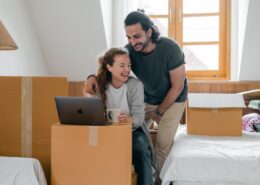Couples Counselling: Who Can Benefit?
Couples Counselling is not just for married couples. Anyone in a relationship can benefit from relationship counselling. Learn more about couples counselling and whether you and your partner would benefit.
Couples Counselling is not just for married couples. Anyone in a relationship can benefit from relationship counselling. Learn more about couples counselling and whether you and your partner would benefit.
Relationships have ups and downs. It is completely normal to experience some challenging times in your relationship. When your relationship or marriage has been struggling for a while, its effects can negatively impact other areas of your life, including your health and wellbeing.
Relationship challenges and the demands of modern life can strain marriages or relationships. Couples Therapists often find that many people do not know how to communicate their emotions and needs effectively or deal with conflict.
Couples counselling can use different evidence-based methods to help couples navigate the different phases and challenges of their relationship.
All couples can benefit from relationship counselling, including:
Marriage or Couples Counselling can be very beneficial to:
Often, partners may be concerned about their relationship, but one or both may be reluctant to see a couples counsellor. If your partner is unwilling to attend couples counselling, you can make an appointment to see a psychologist yourself. You may get some support, ideas and suggestions from your therapist, provide some clarity and point you in the right direction. They can also assist you in initiating the conversation with your partner about why you think it is essential to start couples counselling and find ways to do so safely and comfortably.
How long couples counselling will take depends on your specific circumstances. At the beginning, your therapist will conduct an assessment and provide you with their thoughts on how to best approach treatment. They will also set goals and objectives and determine how many sessions you may need to achieve these.
Your couples therapist will start by thoroughly assessing your circumstances and asking questions about your needs and the outcomes you hope for. Sometimes, couples counsellors conduct an individual session with each partner after their first initial session, but this is not always necessary.
Depending on the evidence-based method your therapist selects as the best fit for you and your partner, you and your partner may need to complete a series of different questionnaires.
Depending on your specific needs and circumstances, your psychologist may also introduce other evidence-based therapies.
Finding the right couples therapist is an essential part of the process and journey towards building a healthy relationship. When choosing a couples counsellor, you might want to consider the following:
 https://www.brisbanecitypsychologist.com.au/wp-content/uploads/2023/09/Couples-Counselling-Who-can-benefit.jpg
867
1300
Maria Bentancor
https://www.brisbanecitypsychologist.com.au/wp-content/uploads/2024/02/transparent-color-logo-2-400x126.png
Maria Bentancor2023-09-14 00:30:062024-03-10 13:19:52Couples Counselling: Who Can Benefit?
https://www.brisbanecitypsychologist.com.au/wp-content/uploads/2023/09/Couples-Counselling-Who-can-benefit.jpg
867
1300
Maria Bentancor
https://www.brisbanecitypsychologist.com.au/wp-content/uploads/2024/02/transparent-color-logo-2-400x126.png
Maria Bentancor2023-09-14 00:30:062024-03-10 13:19:52Couples Counselling: Who Can Benefit? https://www.brisbanecitypsychologist.com.au/wp-content/uploads/2023/08/Couples-Counselling-Brisbane.jpg
867
1300
Maria Bentancor
https://www.brisbanecitypsychologist.com.au/wp-content/uploads/2024/02/transparent-color-logo-2-400x126.png
Maria Bentancor2023-08-31 12:50:582024-06-11 16:32:09Relationship Challenges and Couples Counselling
https://www.brisbanecitypsychologist.com.au/wp-content/uploads/2023/08/Couples-Counselling-Brisbane.jpg
867
1300
Maria Bentancor
https://www.brisbanecitypsychologist.com.au/wp-content/uploads/2024/02/transparent-color-logo-2-400x126.png
Maria Bentancor2023-08-31 12:50:582024-06-11 16:32:09Relationship Challenges and Couples Counselling https://www.brisbanecitypsychologist.com.au/wp-content/uploads/2023/08/Online-Couples-Therapy.jpg
830
1300
Maria Bentancor
https://www.brisbanecitypsychologist.com.au/wp-content/uploads/2024/02/transparent-color-logo-2-400x126.png
Maria Bentancor2023-08-03 23:30:512024-03-10 13:21:11How Online Therapy for Couples Counselling Can Help
https://www.brisbanecitypsychologist.com.au/wp-content/uploads/2023/08/Online-Couples-Therapy.jpg
830
1300
Maria Bentancor
https://www.brisbanecitypsychologist.com.au/wp-content/uploads/2024/02/transparent-color-logo-2-400x126.png
Maria Bentancor2023-08-03 23:30:512024-03-10 13:21:11How Online Therapy for Couples Counselling Can Help https://www.brisbanecitypsychologist.com.au/wp-content/uploads/2023/06/Couples-Therapy.jpg
867
1300
Maria Bentancor
https://www.brisbanecitypsychologist.com.au/wp-content/uploads/2024/02/transparent-color-logo-2-400x126.png
Maria Bentancor2023-06-08 12:14:122024-06-11 16:33:19Navigating Couples Relationship Challenges
https://www.brisbanecitypsychologist.com.au/wp-content/uploads/2023/06/Couples-Therapy.jpg
867
1300
Maria Bentancor
https://www.brisbanecitypsychologist.com.au/wp-content/uploads/2024/02/transparent-color-logo-2-400x126.png
Maria Bentancor2023-06-08 12:14:122024-06-11 16:33:19Navigating Couples Relationship Challenges https://www.brisbanecitypsychologist.com.au/wp-content/uploads/2023/03/Tips-for-Couples.jpg
801
1200
Maria Bentancor
https://www.brisbanecitypsychologist.com.au/wp-content/uploads/2024/02/transparent-color-logo-2-400x126.png
Maria Bentancor2023-04-03 12:00:532024-07-15 22:25:21EFT Couples Counselling Tips to Improve Your Relationship
https://www.brisbanecitypsychologist.com.au/wp-content/uploads/2023/03/Tips-for-Couples.jpg
801
1200
Maria Bentancor
https://www.brisbanecitypsychologist.com.au/wp-content/uploads/2024/02/transparent-color-logo-2-400x126.png
Maria Bentancor2023-04-03 12:00:532024-07-15 22:25:21EFT Couples Counselling Tips to Improve Your Relationship
L18, 141 Queen Street
Queen Street Mall
L4, 10 Felix Street
Next to Waterfront Place
Mon to Fri 7:30 to 20:00 hrs
Phone: 07 3503 6813
Fax: 07 3172 4605

 Simple Strategies for Executive Stress
Simple Strategies for Executive Stress